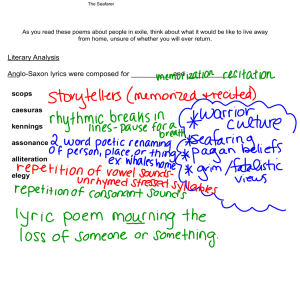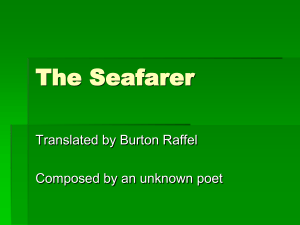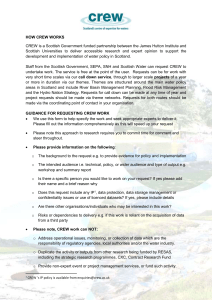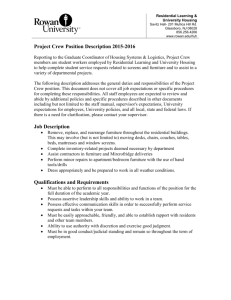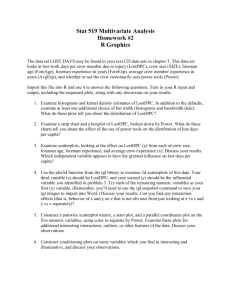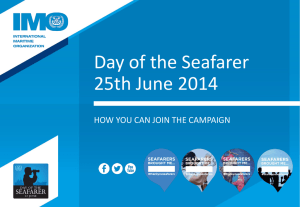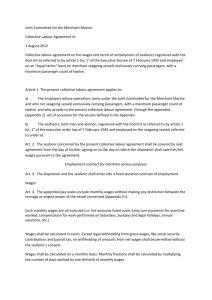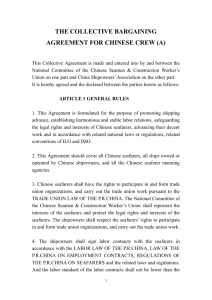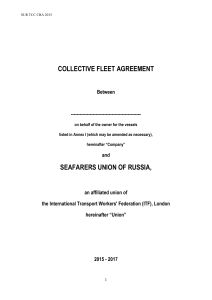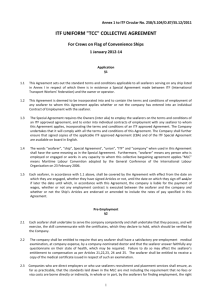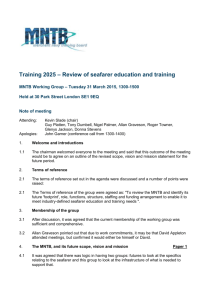Contra-indicators Requiring Further Investigation
advertisement
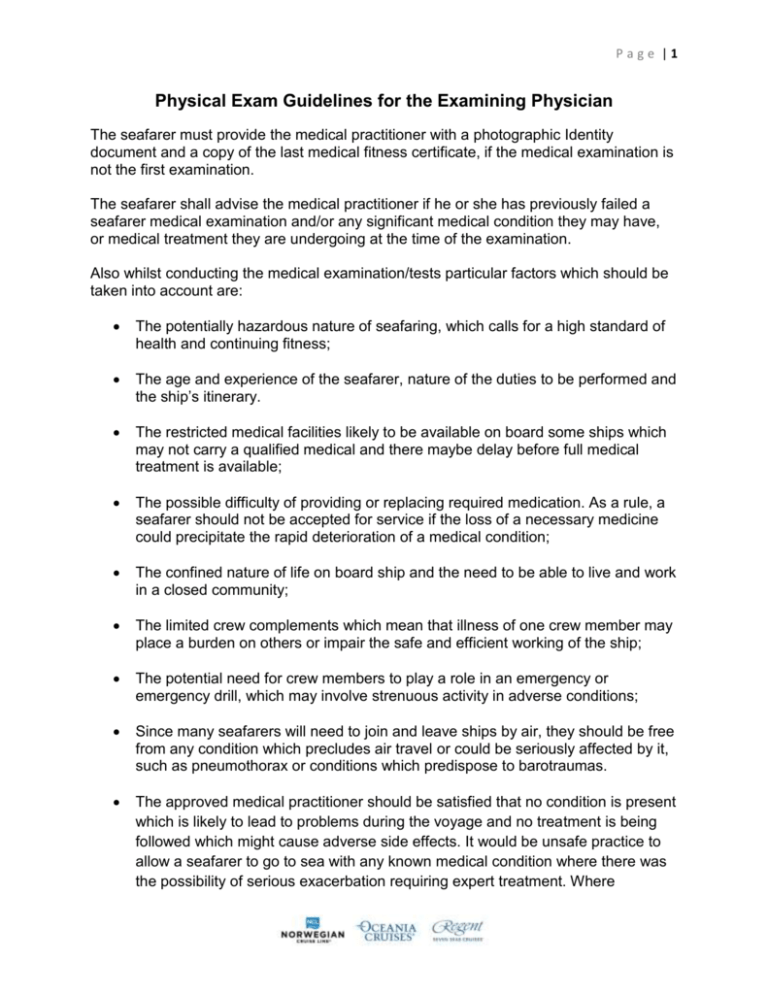
Page |1 Physical Exam Guidelines for the Examining Physician The seafarer must provide the medical practitioner with a photographic Identity document and a copy of the last medical fitness certificate, if the medical examination is not the first examination. The seafarer shall advise the medical practitioner if he or she has previously failed a seafarer medical examination and/or any significant medical condition they may have, or medical treatment they are undergoing at the time of the examination. Also whilst conducting the medical examination/tests particular factors which should be taken into account are: The potentially hazardous nature of seafaring, which calls for a high standard of health and continuing fitness; The age and experience of the seafarer, nature of the duties to be performed and the ship’s itinerary. The restricted medical facilities likely to be available on board some ships which may not carry a qualified medical and there maybe delay before full medical treatment is available; The possible difficulty of providing or replacing required medication. As a rule, a seafarer should not be accepted for service if the loss of a necessary medicine could precipitate the rapid deterioration of a medical condition; The confined nature of life on board ship and the need to be able to live and work in a closed community; The limited crew complements which mean that illness of one crew member may place a burden on others or impair the safe and efficient working of the ship; The potential need for crew members to play a role in an emergency or emergency drill, which may involve strenuous activity in adverse conditions; Since many seafarers will need to join and leave ships by air, they should be free from any condition which precludes air travel or could be seriously affected by it, such as pneumothorax or conditions which predispose to barotraumas. The approved medical practitioner should be satisfied that no condition is present which is likely to lead to problems during the voyage and no treatment is being followed which might cause adverse side effects. It would be unsafe practice to allow a seafarer to go to sea with any known medical condition where there was the possibility of serious exacerbation requiring expert treatment. Where Page |2 medication is acceptable for seafarers, the individual seafarer should arrange for a reserve stock of the prescribed drugs to be held in a safe place, with the agreement of the ship’s master. General Rules: 1. Medical treatment of diseases that are not chronic shall be completed before a health certificate/clearance is issued. 2. All employees that pass the exam and who use long-term medications must have a letter from their treating doctor detailing: a. Name of medication b. Dosage c. Confirmation that permission to use the medication when on duty onboard the ship and that it will not interfere or effect ability to perform their duties. 3. All females must have a urine pregnancy test. 4. Anyone over the age of 40 years old, or with a history of high blood pressure, cardiac arrhythmias, irregular pulse, or heart murmur must have a 12-lead EKG performed. 5. Anyone with a blood pressure greater than 140/90 will require further medical work up/clearance prior to passing them on the exam. 6. All responses with a "yes" reply on the health history portion of the exam must be further addressed by the examining physician. 7. Thorough documentation of all medications and conditions being treated must be documented. Any non-chronic conditions being treated at the time of the exam will negate "fit for duty" status until the treatment is complete. 8. All employees that perform navigational watch function must be able to hear at least 30 dB in the best ear (without use of hearing aid) and 40 dB in their weakest ear at the frequencies of 250, 500, 1000, 2000, 3000, 4000 and 6000 HZ. The sum of decibel loss shall not constitute more than 120 dB in lower (250-2000 HZ) or 120 dB in higher range (3000-6000). 9. Hearing requirements for employees that perform safety function must be able to hear at least 40 dB in their best ear (without use of hearing aid) at frequencies 500, 1000, 2000 and 3000 HZ. Page |3 10. All other employees not mentioned in #8 & #9 above must have satisfactory social hearing. This is defined as being able to understand normal speech correctly at a distance of two meters. Guidelines for the Summary of All Required Exams Prostate Specific Antigen (PSA): This test shall be done to all crew age 50 or greater or crew with a history of prostate problems. Please circle the test result. PSA level 4 ng/mL or under is consider “normal.” PSA level higher than 4 ng/mL, then the Patient shall be declared unfit. Chest X-Ray: Circle the test result. If patient has any indication of TB, enlarge heart, Atherosclerotic Aorta, and/or vascular disease, then further review is required by CMO. Stool Tests: Circle the test result. If result is positive, then further review is required by CMO. Female Crew Members Only: Pregnancy Test: Circle the test result. If result is positive, then further review is required by CMO. Hepatitis Profile: Circle the test result. If result is positive, then further review is required by CMO. Other Tests (HIV, VDRL (Syphilis)): Circle the test result. If result is positive, then further review is required by CMO. .Electrocardiogram (EKG): This test shall be done to all crew age 40 or greater or crew with a history of cardiac problems including hypertension. Please circle the test result. If patient has a history of MI, then Patient shall be declared unfit. **Any questions regarding conditions that could disqualify the person may be addressed by calling the NCLH Crew Medical Department at + 1 305-468-2456. **Any MD found to be falsifying or failing to perform and document a thorough exam will be held accountable if implicated in any type of unprofessional conduct (i.e.: failing to conduct the exam, falsifying lab results, failing to perform mandated testing, accepting buy out or pay offs from the potential crewmember). Page |4 Contra-indicators Conditions for Shipboard Duty Body System: A. Infectious Diseases Contra-indicators Requiring Further Investigation: 1. Active TB or incompletely treated TB. 2. Active AIDS 3. Any active communicable disease B. Malignant Neoplasms 1. Lymphoma 2. Active Leukemia under treatment – not in remission. 3. Acute Lymphocytic Leukemia C. Endocrine/Metablic Disorders 1. Diabetes Mellitus requiring insulin this requires a call to the crew medical department. 2. Diabetes Mellitus poorly regulated with diet or meds. 3. Active Thyroid disease. D. Blood Disorders 1. Anemia 2. ITP 3. Hemophilia 4. Coagulation disorders Page |5 Body System: E. Mental Disorders Contra-indicators Requiring Further Investigation: 1. Any type of psychosis -either active or treated 2. Neurotic disorders (anxiety depression) 3. Personality disorders 4. Degenerative disorders (senility, dementia, Alzheimer’s) 5. Substance Abuse (either drugs or alcohol) 6. Any condition requiring use of mood elevators, anti-depressants, sedatives, etc. F. Diseases of the Nervous System 1. Epilepsy - must be seizure free and on no meds for 5 years 2. Paralysis of any kind 3. Degenerative ailments (multiple sclerosis, spasticity, neuritis, neuralgia) 4. Diseases of balance organs 5. Paresis of body parts G. Cardiovascular System 1. Uncontrolled hypertension 2. Any clinically significant abnormality of rate, rhythm, or conduction disorder 3. CVA or TIA 4. Recurrent or persistent deep vein thrombosis or thrombophlebitis 5. History of extreme cases of varicose veins which would not be suitable for prolonged standing/walking 6. Chronic leg ulcerations secondary to venous stasis Page |6 7. Valvular disease contributing to decreased cardiac function 8. History of caoronary thrombosis/MI Body System: Contra-indicators Requiring Further Investigation: H. Respiratory System 1. Chronic Bronchitis or emphysema with secondary decrease in lung function or pulmonary function testing 2. Uncontrolled asthma or history of frequent flare ups 3. Pneumothorax within past 12 months 4. Sleep apnea 5. Chronic obstructive/restrictive lung disease (Symptomatic @ PEF <70% & FEVI <70%) I. GI 1. Positive hernia that requires treatment 2. Enteritis/colitis 3. Intestinal Stoma 4. Pancreatitis 5. Cirrhosis of liver 6. Chronic hepatic or pancreatic disease 7. Esophageal varices J. GU 1. Hematuria - requires further investigation 2. Symptomatic renal colic 3. Nephritis/nephrosis with impaired renal function 4. Uncontrolled urinary incontinence 5. Untreated hydrocele 6. Urinary retention secondary to enlarged prostate. 7. Untreated hernia Page |7 Body System: Contra-indicators Requiring Further Investigation: K. Skin 1. Severe pustular acne 2. Recurrent eczema 3. Psoriasis resistant to treatment 4. Any type of contagious skin disorder in active flare ups L. Musculo-Skeletal M. Speech N. Hearing 1. Advanced osteo-arthritis 2. Rheumatoid arthritis 3. Wear of any type of limb prosthesis 4. Recurrent incapacitating back pain 5. Any congenital deformity which may preclude interfering with emergency egress procedures 1. Any speech defect which may preclude normal conversation 1. Chronic otitis media 2. Menieres Syndrome 3. Anyone required to wear hearing aid contact crew medical department O. Eyesight 1. Binocular vision required of all 2. Diplopia, night blindness or retinitis pigmentosa Page |8 3. Field vision defects *Ref: 1. Norwegian Maritime Directorate, 10/19/01 pursuant to the Seamen's Act of 5/30/75, no. 18 & 26 third paragraph, ref. Royal Decree of 8/8/75. Ref. Annex VII to the EEA Agreement (council Directive 1992/51/EEC). Amended 11/23/01 no. 1311. 2. "Medical & Eyesight Standars for Seafarers". MSN 1746(M). The Merchant Shipping (Medical Exam) Regulation 1983, SI 1983, No. 808 (as amended by SI 1985 no. 512 & SI 1990 no. 1985). 3. The Bahamas Maritime Authority, Bulletin 103, Revision 3, April 19, 2013 – Seafarer Medical Examination and Certificates. 4. International Labour Organization, ILO/IMO/JMS/2011/12, Guidelines on the Medical Examinations to Seafarers. 5. The Republic of the Marshall Islands, Marine Guideline 7-47-1, Rev 8/13. Guidance on Medical Exams and Certificates for Seafarers. 6. Maritime and Coastguard Agency MCA, Merchant Shipping Notice MSN 1822 (M). Seafarer Medical Examination System and Eyesight Standards: application of the Merchant Shipping (Maritime Labour Convention) (Medical Certification) regulations 2010.
